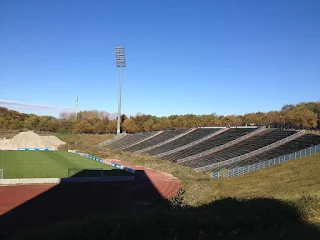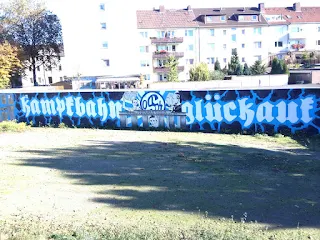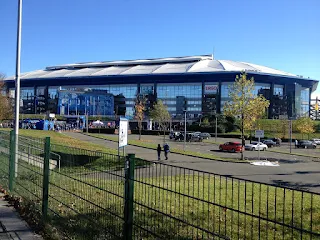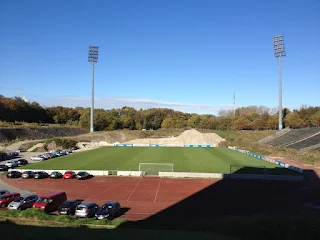Fußball-Club Gelsenkirchen-Schalke 04, to credit them with their full title, is a football club from the mining town of Gelsenkirchen, to the north of the Ruhr in north-west Germany. The club were formed on the 4th May 1904 under the name of Westfalia Schalke after the area of the town where they were based.
The club found it difficult to gain entry into any official leagues, so in 1912, they joined forces with Schalker Turnverein 1877. The arrangement lasted for three years before SV Westfalia Schalke became an independent club. However, it would appear that both clubs needed each other, so they united once again in 1919 as Turn-und Sportverein Schalke 1877.
The club was placed in Gauliga Westfalen, which was one of sixteen top-flight divisions. Schalke won their Gauliga title in the first season before losing to Fortuna Düsseldorf in the national final. A period of dominance in the game followed. Gauliga Westphalia was won in all of eleven seasons it was held.
Schalke remained unbeaten at Glückauf-Kampfbahn and lost only six matches in total. This also led to Schalke being crowned national champions on several occasions. In 1934, 1. FC Nuremberg were defeated 2-1 by the team coached by Hans Schmidt at Poststadion in Berlin, with Fritz Szepan and Ernst Kuzorra scoring the goals in the last two minutes.
 |
| Glückauf-Kampfbahn Stadion |
In 1935, with a dramatic 6-4 win over VfB Stuttgart at Müngersdorfer Stadion in Köln, with Ernst Pörtgen bagging a hat trick, with other goals coming from Adolf Urban, Rudolf Gellesch and Ernst Kalwitzki. Schalke also reached two Tschammer-Pokal finals; the forerunner of the DFB-Pokal in 1935 and 1936, which ended in defeats to 1. FC Nürnberg and VfL Leipzig.
Fortuna Düsseldorf were then defeated 2-1 in the 1937 final. Over 100,000 fans were at Berlin’s Olympiastadion in 1937 to see Schalke beat 1. FC Nürnberg 2-0 through goals from Pörtgen and Kalwitzki. The team reached the final the following year but were defeated in a replay by Hannover 96.
There would be no mistake in 1939 when SK Admira Wien were hammered 9-0 in a tempestuous encounter in which Kalwitzki scored five times, which was added to by Szepan, Urban, Kuzorra and Otto Tibulsky for the team, who were trained by Otto Faist. The title was retained in 1940 as Dresdner SC were defeated 1-0 in the final with a Kalwitzki goal.
The same opponents would gain revenge in the Tschammer-Pokal final the following year, which ended in double disappointment as Schalke were defeated 4-3 by SK Rapid Wien in the Deutsche Fußballmeisterschaft final. Schalke then lost a second successive Pokal final when TSV 1860 München proved too strong.
However, the 1942 season ended in glory as Schalke were crowned national champions for a fifth time. First Vienna were defeated 2-0 as Kalwitzki and Szepan again provided the goals. The club became a founder member of Oberliga West in 1947-48, with the glory days well behind them until 1950-51 when Schalke were crowned as champions before ending as runners-up twelve months later.
The 1954-55 season saw the team finish on the losing side of the DFB-Pokal final to Karlsruher SC before an Oberliga runners-up berth the following season, before another title arrived at the club in 1957-58. The Oberliga title also saw Schalke, coached by Eduard Frühwirth, being crowned as national champions.
Hamburger SV were defeated 3-0 at the Niedersachsenstadion in Hannover, with Manfred Kreuz adding to a Berni Klodt double. Schalke finished third in Oberliga West in 1960-61 and then runners-up the following season before becoming founder members of the Bundesliga in 1963-64, in which the team struggled for several seasons.
The goals of Klaus Matischak offered cheer to the Glückauf-Kampfbahn Stadion faithful before Schalke lost in the 1968-69 DFB-Pokal final to Bayern München. The team showed signs of improvement, which would bear fruit in 1971-72 under coach Ivica Horvat.
The goals of Klaus Fischer and Klaus Scheer took Schalke to runners-up as well as winning the Pokal 5-0 against 1. FC Kaiserslautern in Hannover, as a brace from Erwin Kremers was added to by Scheer, Fischer and Herbert Lütkebohmert. However, the joy was tainted as several players, including German internationals Fischer, Stan Libuda and Klaus Fichtel, were initially given life bans.
They were later reduced to six months to two years' sentences after being found guilty of match fixing. In 1973, the club moved to the new out-of-town Parkstadion, which had been built for the 1974 World Cup with a capacity of 70,000, while Glückauf-Kampfbahn Stadion was retained for Schalke’s other sides to use.
The prolific Fischer carried on where he left off before his ban as the club recovered before finishing as Bundesliga runners-up in 1976-77. Despite goals from the emerging Rüdiger Abramczik, the team then struggled once again before being relegated in 1980-81.
 |
| Parkstadion in its prime |
Schalke bounced back to win the second level at the first attempt under coach Sigfried Held and the reliable Norbert Nigbur in goal. However, the club's top-flight stay lasted just a year before they went back down to 2. Bundesliga after a play-off defeat to Bayer 05 Uerdingen. Again, Schalke recovered to regain their top-tier status at the first attempt.
The goals of Klaus Täuber helped the side consolidate in 1984-85 before going back down in 1987-88. Ingo Anderbrügge, Alexander Borodjuk and Peter Sendscheid contributed with goals before Schlake won the 2. Bundesliga title in 1990-91 with Peter Neururer, Fischer and Aleksandar Ristić all having spells as coach throughout the campaign in which Jens Lehmann kept goal.
Schalke entered into a period of mid-table stability before finishing third in 1995-96, which allowed Huub Stevens’ side entry into the UEFA Cup. A run including wins against Trabzonspor, FC Brügge, FC Valencia and FC Tenerife took the team to the final. Internazionale were defeated after a penalty shoot-out at the San Siro, after the scores were level on aggregate.
Olaf Thon stepped forward to lift the trophy. Ebbe Sand would add goals for the club as another runners-up league spot was achieved in 2000-01 as Schalke came desperately close to the title. Union Berlin were beaten 2-0 in the Pokal final as consolation, as Jörg Böhme netted both goals.
The brand new Veltins-Arena was opened to replace the outdated Parkstadion before the Pokal was retained in 2002-02 following a 4-2 win against Bayer Leverkusen with Andreas Möller and Victor Agali adding to goals from Böhme and Sand. Frank Neubarth and then Marc Wilmots replaced Stevens before the arrival of Jupp Heynckes as trainer.
He was replaced by Ralf Rangnick, who led his side to the 2004-05 DFB-Pokal final, where they went down to Bayern München as well as runners-up in the league with Aílton top scoring. Schalke finished third in their Champions League group the following season as Mirko Slomka took over as chief trainer of Die Königsblauen in January 2006.
The team went all the way to the semi-finals of the UEFA Cup, where they lost to eventual winners Sevilla FC. The goals of Kevin Kurányi helped his side to third in 2006-07 before they finished as runners-up in 2009-10, as Jefferson Farfán created the chances for the team led by Felix Magath prior to Rangnick returning as coach in March 2011.
He was at the helm as Schalke lifted the 2010-11 DFB-Pokal with a 5-0 hammering of MSV Duisburg as keeper Manuel Neuer captained the star-studded side, including Raúl, Joël Matip and Christoph Metzelder. Klaas-Jan Huntelaar bagged two goals along with others from Julian Draxler, Benedikt Höwedes and José Manuel Jurado.
Stevens returned as trainer and took the side to third place in 2011-12, with Lewis Holtby being added to the squad. Jens Keller replaced the Dutchman in 2012-13 when fourth place was achieved, with neither season going any further than the first knockout stage in the Champions League.
Schalke made third place again in 2013-14 with Roberto Di Matteo arriving as trainer the following season before being replaced by André Breitenreiter, who helped the team improve to fifth in the Bundesliga season of 2015-16.
 |
| Parkstadion in 2012 |
In 2016-17, Schalke reached the last eight of the Europa League before being knocked out by Ajax under new coach Markus Weinzierl. The guile of midfielder Daniel Caligiuri and Amine Harit helped the team trained by Domenico Tedesco to a league runners-up berth in 2017-18 before reaching the first knockout stage of the Champions League.
Domestically, the 2018-19 campaign was one of disappointment, which saw Stevens return for a third time to take over team affairs towards the back end before the appointment of David Wagner in the summer of 2019. Dimitrios Grammozis took over as chief trainer before the end of the 2020-21 season, which ended in relegation.
Michael Büskens led the side to the 2. Bundesliga title with Simon Terodde as top scorer. Thomas Reis had been appointed as chief trainer in 2022-23 as Schalke were demoted once more. Mid-table finishes under Karel Geraerts and Jakob Fimpel ensued, before Miron Muslic was put in charge of the team for the 2025-26 season.
FC Schalke 04 will play in the 2. Bundesliga in the 2025-26 season.
FC Schalke 04 1 1.FC Nürnberg 0 (Saturday 27th October 2012) 1. Bundesliga (att: 61,673)
I was in Germany on day two of four and eager to have another brilliant day after the pleasures of the day before. I was in really good form, having visited some new grounds and seen a cracking 3-3 draw at 1. FC Köln. The new day was cool but sunny and had started really well for me as I'd got inside another excellent venue, the home of KFC Uerdingen in Krefeld.
Despite Fortuna Düsseldorf being at home that afternoon to Wolfsburg and me staying there, I had difficulties accessing the ticket shop online, whereas I managed to get a password from Schalke. As I was travelling solo, I figured I may not get too many chances to get a ticket for the Veltins-Arena, so I bought one while I could. I €41.50 for my seat, which included delivery to my flat in London.
A large Danish pastry and a coffee put me on track as I took a train to Duisburg, where I had to change for the Gelsenkirchen service. I was ahead of time, and I sent a text to Matt Lawson back in England to see if the stadium of Rot-Weiss Essen was close to the Hauptbahnhof. As it turned out, it was quite a distance, so I jumped on board a busy train which had plenty of the Königsblauen faithful on board as well as a gaggle of jolly Hansa Rostock fans.
I was going to engage in some talk of how brilliant Uwe Rösler was in his prime, but there's nothing worse than seeing proper fans cry. I gave them a smile and good luck and went straight downstairs to the trams.
For reasons best known to myself, I got on the first one that arrived, despite the Schalke fans looking on. I alighted at the next stop, Heinrich-Konig-Platz and realised the service I required, the 302, was seven minutes away. I went upstairs for a look around and to see if I could find a cash machine.
Now, as ever, I'd done a fair share of research. I knew that the Veltins-Arena was in the middle of nowhere, but I also knew that the Schalke district was on the way, so I headed in that direction as I wanted to see if it was possible to have a look inside Glückauf-Kampfbahn as well as take in the pre-match atmosphere in a bar or two.
I climbed the stairs and went inside to the concourse and purchased an Arena Card from a helpful lady who spoke good English. I looked down at a fan's area outside the stadium where the youths from the tram looked to be. It then dawned on me. Somehow I'd arrived ninety minutes before kick off! I laughed to myself.
The two big locals next to me never stopped drinking all the match, with them taking it in turns to go downstairs for the lubrication. They were very pleasant, and I was offered a cigar, which, tempting though it was, I managed to turn down. It was certainly a more relaxed way of watching a game than in the UK.
The home fans were starting to get restless in the second half as they struggled to find a way through. I was convinced that the game was going to end scoreless. The mood wasn't helped by updates of Dortmund going into a two-nil lead at Freiburg.
I headed down onto the concourse and went round as far as I could to near the tram station, returning my card as I went. Despite the huge crowd, it was easy to get out, although rogue vendors setting up stalls in the middle of the walkways weren't a great help. I got on a tram straight away and managed to catch the 6.04 train back to Düsseldorf, which amazed me.
I am by no means a fluent German speaker, but we got through to each other as we all tried hard. Smiles and sign language can go an awful long way if you really want them to. I continued my little wander and ended up in the bar decorated with chickens. It was only small, but it had a great atmosphere every time I'd been in.
Time was getting on, and I wanted to leave with a clear head. I purchased a wonderful couple of slabs of pork in bread from the corner takeaway that had never let me down, and headed back to my budget hotel. The wonderful transport system of the city had me back and in bed in less than thirty minutes.






















No comments:
Post a Comment